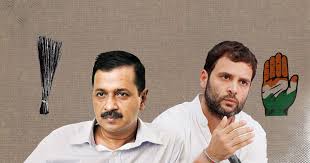
Just as possibilities of a Congress-AAP alliance looked more and more unlikely, Congress president Rahul Gandhi for the first time on Tuesday shed clarity on whether a tie-up was possible in the next few days.
“There is no confusion on this, the situation is clear. We have constructed alliances and are constructing alliances, and are open to flexibility”. Interestingly, AAP chief Arvind Kejriwal had told reporters just on Monday that Rahul Gandhi said ‘no’ to an alliance with AAP.
Despite Gandhi saying that the situation is clear, the two sides remain as far apart as ever when it comes to joining hands.
Gandhi had a meeting with the two warring sides in Congress – the pro-alliance lobby led by PC Chacko and the anti-alliance lobby led by Sheila Dixit. While Dixit remained silent after the meeting, Chacko simply indicated that options were open.
AAP Rajya Sabha member Sanjay Singh, said that there had been no talks with the Congress on alliance – either formal or otherwise – reacted cautiously to Gandhi’s statement.
“We will discuss with AAP convenor and party chief Arvind Kejriwal and only then can comment”.
Singh also remarked that if the Congress is serious about gathbandhan, it should re-think its strategy in Uttar Pradesh, Bengal and Kerala – states where he says the Congress is weakening regional parties and in the process “strengthening the forces of hatred”.
While it is clear that there have been no discussions across the table between the two parties yet, (Rahul Gandhi had to give a go-ahead, AAP needed a formal indication), there are various seat sharing formulas that are being discussed internally.
Singh had indicated to NCP boss Sharad Pawar recently that an alliance formula across four states – Delhi, Punjab, Haryana and Goa – and AAP’s Gopal Rai had also repeated the same formula at a press conference a few days later.
The Congress is learnt to have discussed a 3:3:1 (three seats for both Congress and AAP and one mutually accepted candidate) or a 4:3 (four seats for AAP and three for Congress) formula in Delhi. This, though, remains unacceptable to AAP.
The AAP, sources said, is slowly veering to the position that an alliance with the Congress just in Delhi is not worth the price. AAP is clearly indicating that it wants space beyond Delhi.
If the alliance is restricted to Delhi alone, then AAP is not willing to give more than one seat to Congress, and that too, just to send the signal that stands together with the ‘gathbandhan’.
AAP sources indicate that the party is willing to give two seats in Delhi, if Congress is also willing to give two in Haryana, and may consider giving three seats in Delhi, if Congress adds 3 seats in Punjab. AAP is also keen on a partnership in Chandigarh and Goa.
While top sources within AAP accept Congress does not need its support in Punjab, and Chief Minister Amarinder Singh, like Sheila Dixit, has said a clear no, for the AAP, the issue it that of its four sitting MPs in Punjab. Of all the possibilities, Congress allying with AAP in Punjab is most unlikely.
AAP has also sharpened both its attack on the Congress and campaign on the ground, with Arvind Kejriwal hitting the road every evening with multiple meetings. Even on Tuesday, Deputy CM Manish Sisodia targeted the Congress for not promising full statehood and betraying the people of Delhi in its manifesto.
For Rahul Gandhi, who had already communicated to AAP chief Arvind Kejriwal on February 13 that an alliance is not possible, it is not an easy decision. Gandhi is under pressure from allies like Sharad Pawar and Mamata Banerjee not to allow BJP a walkover in Delhi.
Additionally, he also has to confront the ground realities of the Congress in Delhi, where without an alliance, the party may very well draw a blank. He is also under pressure from the pro alliance lobby – Ahmed Patel, PC Chacko and Ajay Maken, who clearly want an alliance.
Both AAP and Congress share a past which indicates a deep distrust of each other. The AAP formed its government in 2014 with the “unconditional support” of eight MLAs of Congress party and yet Kejriwal not only resigned, he also initiated an investigation into alleged scams which had former CM Sheila Dixit at its center.
When AAP returned with a thumping mandate, the Congress party, in turn, never supported AAP in any of its battles with the central government – whether it was sovereignty for the elected government or disqualification of its MLAs or arrests of more than 35 of its MLAs or the raid in the CM Arvind Keriwal’s office.
Most crucial for both parties are the Assembly elections scheduled in less than a year as both parties share the same voter profile and base.